
Hyundai i20 N Review

Introduction
What happened to the likes of the Fiesta XR2 or Nova GSE? While we all have to grow up, can’t we be left with at least a little bit of affordable fun?
Hyundai thinks the same way, and aside from making thoroughly sensible family cars and SUVs, it’s turning its hand to making hot hatches again. It started with the i30 N but is following that up with something lighter, smaller and cheaper.
The i20 N probably isn’t a car we need, but it’s one we think we’ll want. Can Hyundai really bring back the magic of the 80s while meeting all of its (very sensible) environmental and social demands?
Select's rating score* - 4.4 / 5
At a Glance
You can spot the Hyundai i20 N from some distance; if the large darkened alloy wheels don’t give the game away, then the roof-mounted spoiler will. The aero additions appear all around the car, from a front splitter, through side skirts, and on to a purposeful diffuser at the rear.
The grille is intended to remind you of a chequered flag, while the triangular fog light at the back, mounted down low and dead centre, hints at the rear light on a Formula One car. As Hyundai enters its i20 N into the World Rally Championship, the motorsport hints aren’t unjustified.
Power comes from a 1.6-litre turbocharged engine that develops 204hp — four up on the Fiesta ST and three down on the Polo GTI. That’s a bit more potent than a regular i20, which makes do with a 1.0-litre engine developing 100 or 120hp.
Besides more power and some decorative pieces, Hyundai’s N division has worked on the car to create what is, arguably, the finest compact hot hatch we’ve seen in a generation.
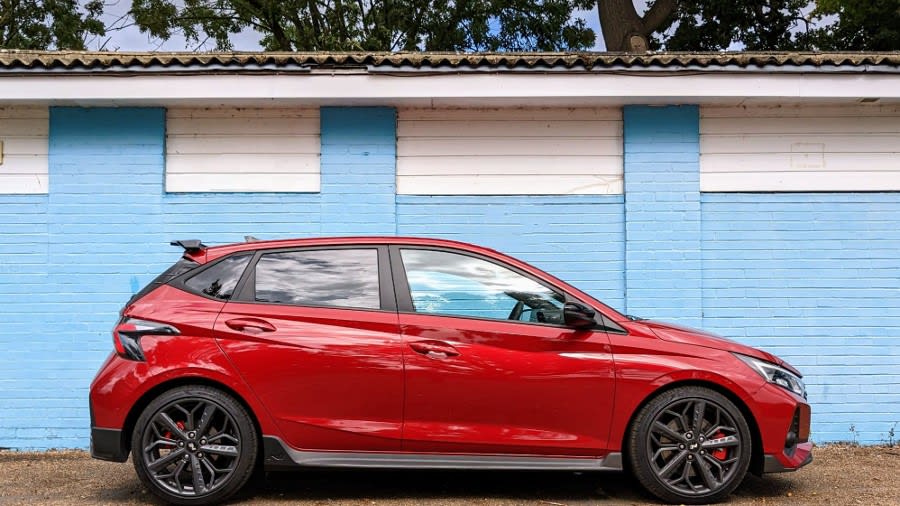
Key Features
The biggest thing about the Hyundai i20 N? The letter N. It’s everywhere, both physically and conceptually.
If you’ve ever heard of a BMW M or an AMG Mercedes, you’ll know what to expect from a Hyundai N. It’s the same as a regular i20, but so much more, thanks to development work from a dedicated division of engineers and designers.
Of course, these engineers and designers also work with a marketing team, so everything they’ve produced has been given some N branding. You'll find the N Performance Braking System (brakes), N Grin Control system (drive modes), N Corner Carving Differential (a limited-slip diff) and N Rev Matching (an automated blip of the throttle when changing gears), amongst many, many other things with the letter N before it.
It might be a bit of silly branding, but the technology that underpins it all comes together wonderfully.
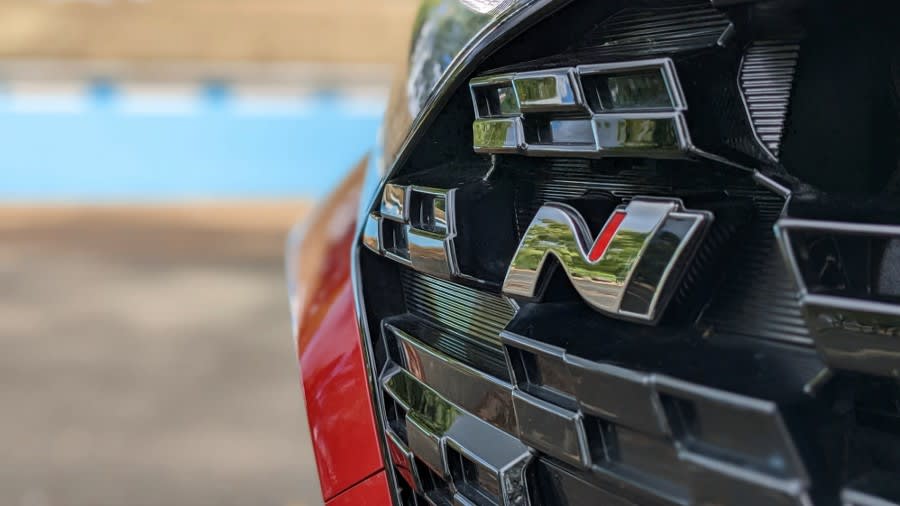
Performance & Drive
S Bend Ahead. A simple message on the instrument panel could have been seen as a warning, but it was followed by something along the lines of ‘Engage N Mode?’. I don’t, as I’m trying to figure out what’s what on the car, but it’s a marker of Hyundai’s intent. Far from sensible and grown-up, the i20 N is little more than a toy.
But sometimes you have to be sensible, so for those moments: the suspension is irritatingly firm, and the engine is quite buzzy at motorway speeds, but the quick steering makes city driving easy. The gearbox is fine if unremarkable, and you have to wait a little bit for the turbo to get up to speed before there’s anything beyond lacklustre performance.
And then you hit that blue steering wheel-mounted button marked N — the one above the big red button marked REV, not the other blue button marked N. Pressing that transforms the i20 into a hard-edged hot hatch that carves through corners like a Super-G skier. The grip levels are immense, helped by super-firm suspension and that N Corner Carving Differential. It’s just a limited-slip differential on the front axle, but it’s tuned perfectly and ensures the tyres keep near-perfect contact with the tarmac.
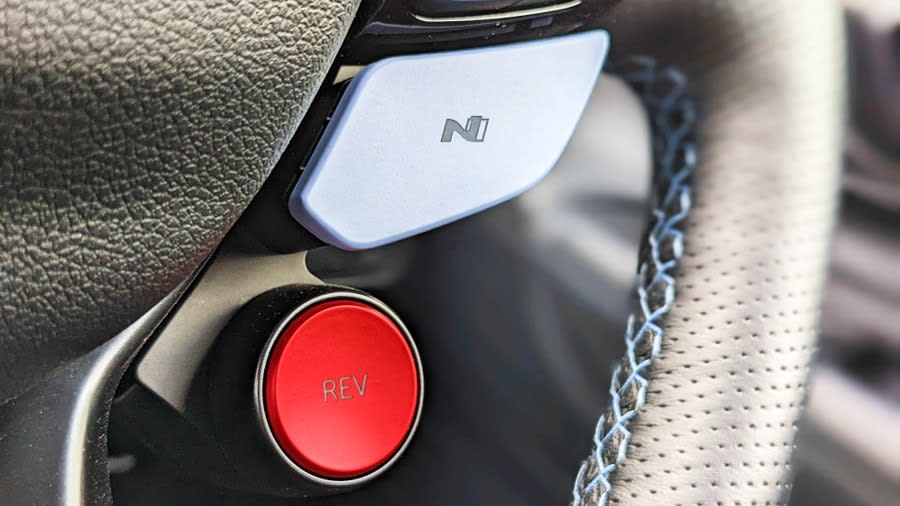
Press the throttle hard, and a growl comes from… the speakers. Few modern engines are particularly sonorous, so Hyundai has boosted the soundtrack with some digital accompaniment, and quite successfully. It encourages you to press harder, which is good as that’s where the engine is at its best, especially as the N button frees up more torque, extending it to 304Nm for 20-second bursts.
The REV button adds automated rev-matching, with computers giving the throttle a blip as you shift down the gears, leading to a comedy situation of arriving at a zebra crossing sounding like I’m Ott Tänak attacking the Rally GB. Once the pedestrian had cleared, it seemed rather loutish to use the launch control. 0-62mph takes 6.2 seconds if you’re wondering.
There’s a risk that loading the i20 with driver-assisting technology could dull the experience, but it’s all been carefully considered to ensure it remains an aid rather than an interference. Finding the edge of its capabilities doesn’t take long, and keeping the car in that zone is easier than in its rivals.
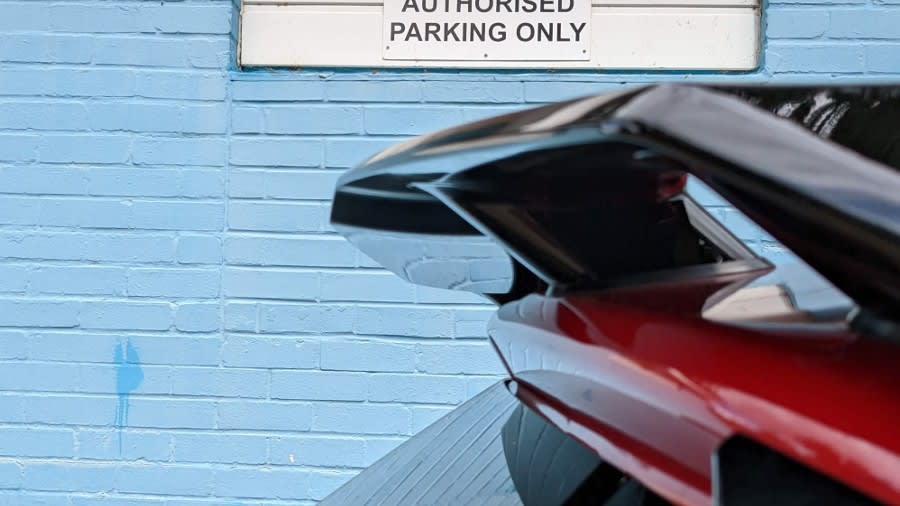
Running Costs
In a world of high inflation and rising costs, Hyundai’s £26,230 price tag seems positively good value. If you doubt that, remember you can spend more on a Vauxhall Corsa with a 1.2-litre engine. It’s also a little cheaper than the Fiesta ST and some way below a Polo GTI. Leasing rates are broadly similar between the Hyundai and Ford, but the Volkswagen, thanks to strong residual values, works out a bit cheaper each month.
For when you’re not trying to beat a flowing A road into submission, economy is pretty good. Hyundai promises 40.4mpg, according to WLTP testing, and we managed that without too much difficulty. Go the other way, and sub-20mpg will be the result.
The i20 N is backed by a five-year warranty, which should see you through a lease deal without facing any big bills.
Interior
Attention is immediately drawn to the steering wheel, which makes a confusing first impression. The blue ‘N’ button on the left-hand side of the wheel is matched with an er, blue ‘N’ button on the right-hand side. That sits above a bold, bright red REV button that does nothing but switch the rev-matching system on and off. You’ll not touch it once you’ve got over the novelty.
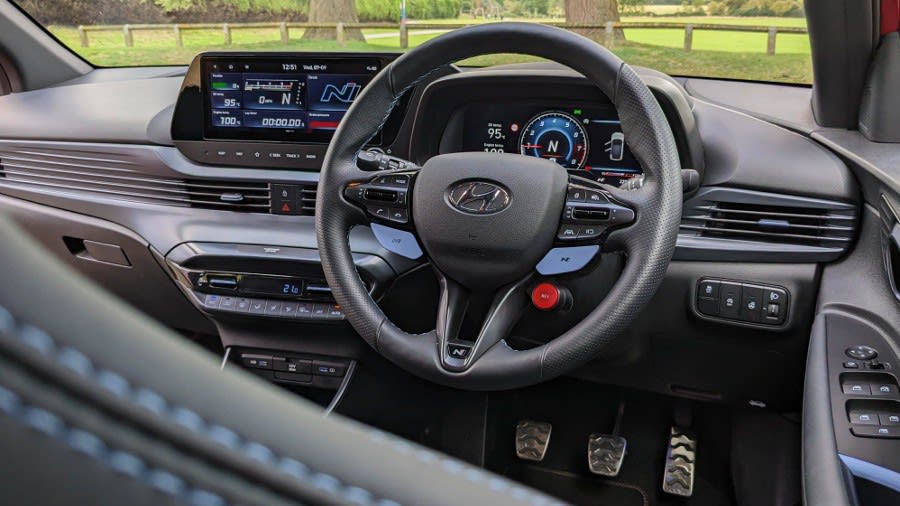
Aluminium pedals, leather and suede-trimmed sports seats — with ‘N’ embossed on the headrests — and a gear lever with blue leather detailing lifts the cabin, but there’s no escaping the fact it usually forms a sensible family car. The layout of the controls is clear, with climate control buttons and switches sitting above USB ports, a wireless charging pad for a smartphone, and the heated seat and other switches.
Above is a 10.25-inch infotainment screen, which is much like every other screen — apart from the N screen. This displays g-forces, throttle usage, and brake pressure and even offers a timing screen for when you’re lapping Huntingdon Ring Road. It’s customisable, showing just the things you want, and offers single-tap buttons for changing the exhaust note and power steering assistance. You’ll also find everyday technology like a DAB radio, navigation and both Android Auto and Apple CarPlay.
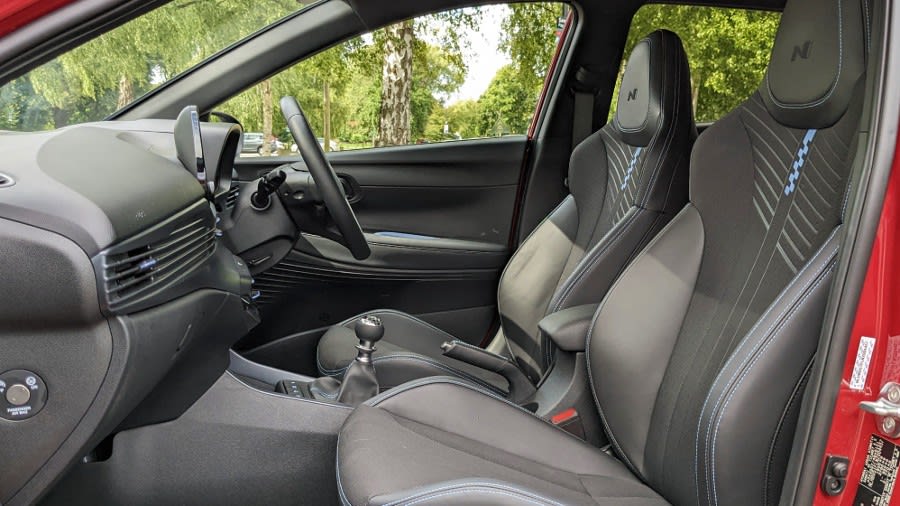
A fully digital instrument panel sits in front of the driver, which can be clear and readable or covered in flash graphics, depending on your mood.
Front-seat passengers get plenty of room, despite the car’s relatively small dimensions. Those in the rear won’t complain too much, but it’s best to ignore the promise of a middle fifth seat and treat the i20 as a four-seater. The boot, at 352 litres, is larger than the Fiesta's and on a par with the Polo's.
Safety
Euro NCAP hasn’t tested the Hyundai i20, but it has put the Hyundai Bayon SUV through its comprehensive set of safety tests. As the Bayon is little more than an i20 with a chunkier body on it, the results are valid for both cars, which means the i20 gets a four-star safety rating.
Hyundai hasn’t been stingy with the safety technology on board, with the i20 N fitted with automatic emergency braking, collision avoidance assistance with pedestrian and cyclist detection, lane keeping assist, traffic sign recognition with intelligent speed limit warning, a reversing camera, parking sensors, and automatic wipers.
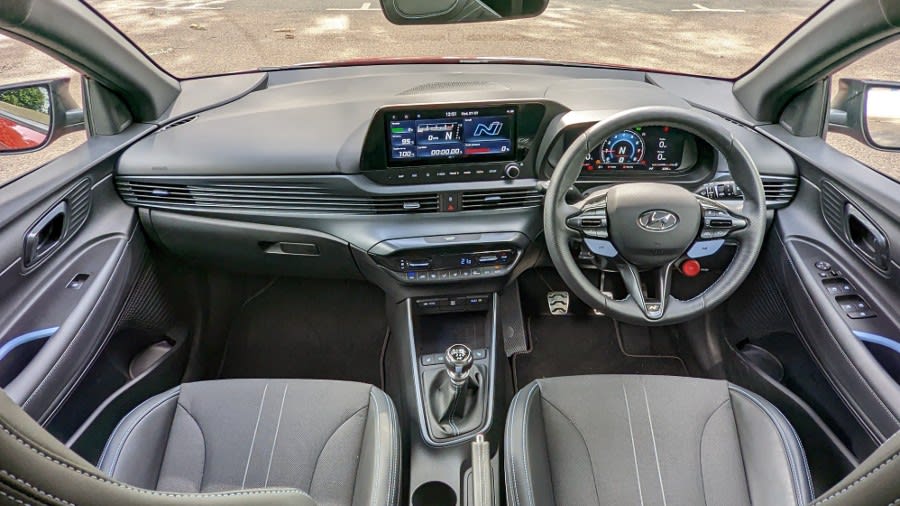
Options
Hyundai likes to keep things simple, so options are few and far between.
It comes with a dark blue paint job as standard, but you can splash out £300 for white (it looks good) or £565 for black, red or ‘performance’ blue. A contrasting black roof is another £500.
Fancy a Bose sound system? That’s also £500 and brings the options list to an end.
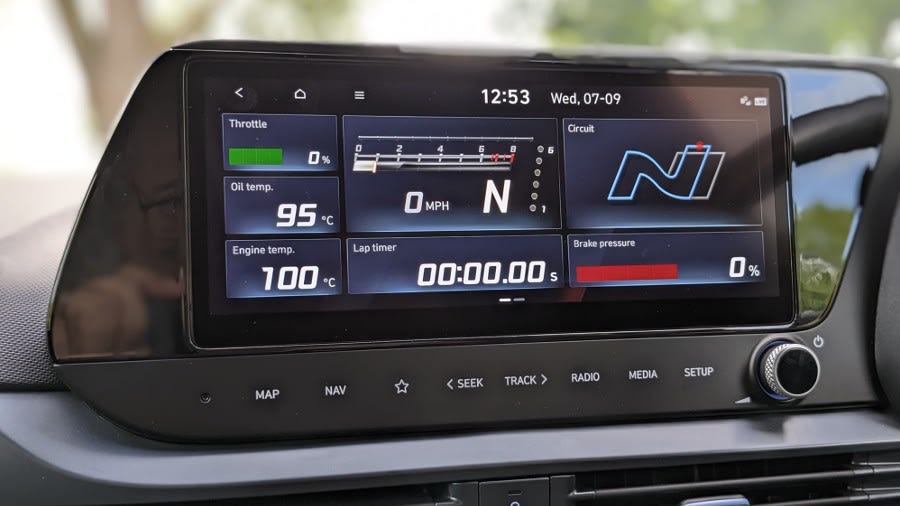
Rival Cars
It won’t be long before the Ford Fiesta disappears from brochures, but the ST version is the highlight of the current — and final — range. It’s a delight to drive, with precise dynamics and a great engine. It’s very firmly suspended, though, and you need to pay extra to get the most out of it.
The Volkswagen Polo GTI is quick enough but settles down to be easy to live with. Despite the noise and stiff suspension, it’s not that much fun to drive, though.
A Suzuki Swift Sport is the cheapest option, but you get a lightweight model that’s enormous fun to drive hard and surprisingly economical when driven gently. It’s not that quick, though, and lacks practicality.
Verdict
Hyundai might have tried to walk a fine line between a usable family hatchback and a bonkers road-legal rally car but would have failed on both counts. What it’s done is make a thoroughly pleasing hot hatch to appeal to enthusiasts that might occasionally not want to drive at ten-tenths.
Getting the hang of the seemingly endless N technology will help you get the most from the car, but the smart driver will set their own preferred driving mode, switching that on with a single click of one of those bold blue buttons. Then you’ve got a car you can bring to life at will, without needing a prompt on the screen telling you there are S bends on their way.
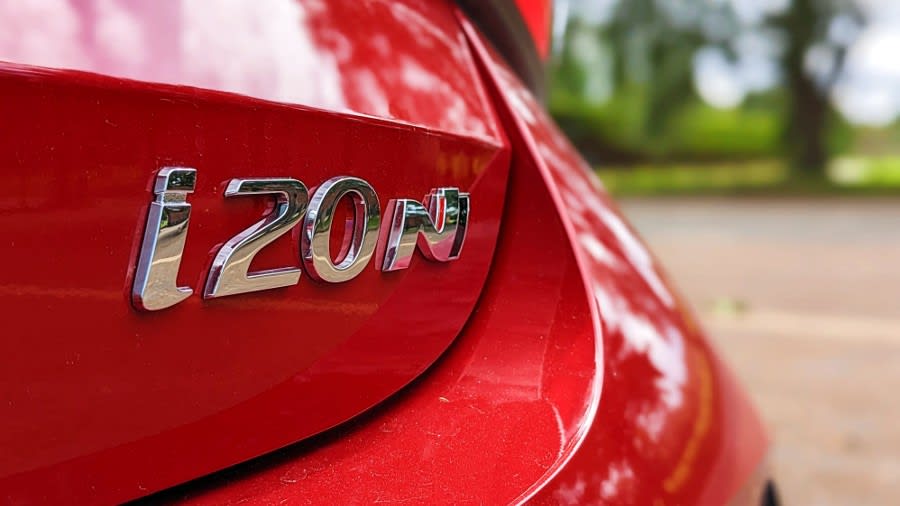
Where to next?
View latest Hyundai i20 N leasing deals - from just £387.69per month inc VAT**.
Call us on 0118 3048 688 or hit the green 'Enquire' button for more details.
Looking for a great leasing deal? Check out our incredible range of car lease deals.
New Hatchback? Read our latest Car Reviews and find the right model for you.
Want to know more about leasing? Take a look at our comprehensive Leasing Guides.
Interested in everything motoring? Why not catch up on all the latest Car Leasing News.
**Score based on Select’s unique meta score analysis, taking into account the UK’s top leading independent car website reviews of the Hyundai i20
**Correct as of 19/06/2023. Based on 9 months initial payment, 5,000 miles over a 48 month lease. Initial payment equivalent to 9 monthly payments or £3,489.21 (Plus admin fee) Ts and Cs apply. Credit is subject to status.





















